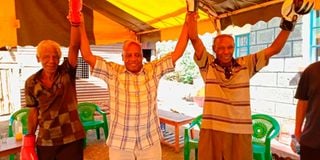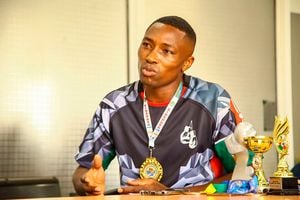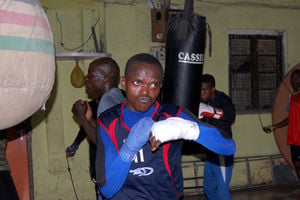
From left: Retired international boxer Philip Mainge, AIBA referee Mwangi ‘Don King’ Muthoga, and ex-Olympian Philip Waruinge during a mock boxing contest at Mainge's Wanyororo home in Nakuru in 2018.
Days are long gone when lovers of boxing used to gather in small groups to discuss the country's success in the game.
Time was when boxers from different clubs would compete against each other with fans filling the halls to capacity either to cheer their favourite boxers, or just enjoy the sport.
That is long gone and whatever is left are organisers with no clear direction as to how to guide boxers from clubs to the national teams. Kenya did not send a single boxer to the 2024 Paris Olympic Games -- a sign of how low Kenyan boxing has deteriorated.
Philip Mainge, a 78-year-old boxing specialist of long standing, who lives in Wanyororo, in Bahati Constituency, Nakuru County, is of the opinion that local boxing officials and coaches have to go back to the drawing board and do a thorough surgery to this once popular and thriving sport in the country.
Catching up with the well-known Mainge was easy. He is a small-scale farmer in Bahati and rather busy with sporting issues including boxing and cycling. A phone contact given and the interview was on.
"Let me put my mind into boxing where I research thoroughly. I have watched the late Philip Waruinge's fights on YouTube. You can simply refer to him as a boxing "scientist". He was so stylish in the ring that even the judges who wrongly denied him the win could not ignore public anger and boxing organisers had to award him the Val Barker Trophy as the best boxer," Mainge says.
He further says the days of watching classic bouts are long gone and forgotten and it is time we start from where the rains began beating us.
“Boxing is an art. The moment a boxer puts on his gloves and gets into the ring, he cannot throw all the blows learned during sparring to his opponent. He must be a thinking person. Boxing is not like goats or sheep head butting fights. A boxer must think about what he is doing. He must first protect himself then hit through his opponent's target using the knuckle part of his gloves,” Mainge voices his wisdom.
Mainge recalls having been given these instructions by Maxie MacColough, an Irish boxing trainer who handled boxers at Nakuru Amateur Boxing Club (NABC) between 1962 and 1969.
Mainge says the Irishman insisted that one had to think about what he was doing in the ring all the time. There is what is called the "fighting distance" that a boxer must maintain all the time so that his blows reach the target.
Mainge says to understand this, one can see how Waruinge was scoring points during the 1966 Commonwealth Games in Kingston, Jamaica.
He was never far away from Paddy Maguire and danced beautifully as he scored points and Maguire also did the same.
Surprisingly, when you watch the current boxing championships, you realise it has turned out to be a killer sport. Why? Because of the initial training using the pad! They turn a boxer that gets that "killer instinct" intentions to finish his opponent at the earliest moment possible.
The coach cannot teach the boxer the fighting distance but he must insist during the sparring sessions where a boxer must strike their opponent at the same time using the ring craft manoeuvres to and fro as he attempts to earn a point.
Mainge recalls when MacColough used to tie a rope on a boxer's loins so that they do not box being away from one's opponent.
He says one has to remember that training on pads is trying to score blows to an imaginary "opponent" where the coach gives instructions on the type of punches to administer. In the ring, it is just the opposite. The sparring opponent will no doubt react against blows delivered through his target by moving forward or backwards.
One has to remember it is during training that a boxer must bear in mind that the spectators didn't pay tickets to watch one destroying the opponent. They paid to watch boxers exchange blows cleverly and at the same time enjoy the contest for about 12 minutes, divided into rounds of three minutes each.
However, boxers are confused when they watch pro boxing as compared to the amateur status.
Mainge observers their styles differ, where pro boxing is about money via beating your opponent quickly. Watching our novices championships, one can tell the problem emanated from the training where very little sparring sessions are done and instead training on the pads is the norm.
Regrettably, you will hardly see boxers like the late Waruinge being invited to give lectures to young boxers.
The new coaches, some who never boxed, don't like to interact with the old boxers. Why?The training methods differ greatly.
During his time, Mainge says, MacColough insisted they adapt the defensive/offensive tactics using counter punches.
They were taught to swivel 180 degrees the moment one touched the rope trying to pin his opponent where one was capable of delivering a flurry of blows.
They were taught to try their best to pin their opponent in the corner where blows like uppercut, body blows, left or right hooks were applicable.
Here, jabs or straight left or right were undesirable and ineffective. Every boxer must think of being declared the best boxer or best loser in every championship and these awards are not given to bouts that end with KOs (knock-outs) or RST (Referee Stop Contest) .
Mainge feels today's boxing isn't about the art but the contestants who fight to win using any trick available.
Mainge, fighting as a flyweight, won best boxer award in the 1963 Kenya Intermediate Boxing Championship. He was given best loser award in the 1965 American Army Boxing v NABC tournament and best loser at the 1969 Kenya Open Boxing Championships in Nairobi.
These awards came after three rounds of a boxing contest were over. Not via a knock-out!
Mainge won the 1963 Kenya Novices Boxing Championship, 1963 Kenya Intermediate Boxing Championship and was runner up in the 1969 Kenya Open championships
Whenever Mainge watches videos of local boxing, he says his heart bleeds, because what he sees is just the throwing of punches aiming at the head. Nobody blows, hooks, uppercuts and such like swings. It seems the idea is to beat one’s opponent until the referee says, "Stop!"
"I boxed Harlan Marbly from the United States for three rounds in 1965 where he was warned by the referee for bending below the belt. I was only three years in the ring. It was my debut in international boxing. He had 50 international fights to his credit. I beat him in the first round but he managed to edge me on points. There were no KO intentions but moving in the ring to and fro throwing accurate punches with less infringement. Ours was boxing," Mainge says.
“Today it is ‘maliza twende - finish and go’ skills just like the way one punches the pads! Far from it. Watch the late Waruinge on the video and that is the way boxing is done. You can hear fans shouting with joy before the round comes to an end. Finally, train the beginner using the pad.
"Later get him into the ring to face a boxer, not the pad one punches with a lot of gusto! Box applying learned skills not the killer instinct ones. The target in boxing isn't the head but a sort of square on the body but not below the belt, the top of the head, on the kidney or the back of the opponent's body.
"Shake hands before the contest and the end of the third round. No shaking of hands after the KO or RSC decision. I never won my contest on KOs. Why? My style was boxing using defensive and offensive tactics."
Mainge beat Isaac Maina in Nakuru when MacColough arranged for them to box the team which was to represent Kenya in the 1968 Olympic Games in Mexico City.
Nothing is as demoralising as watching coaches and managers openly showing bias while selecting boxers to represent the country in major tournaments like the Olympics.
Despite being beaten by Mainge, Maina was included in the boxing team that went to Mexico leaving the more talented Mainge out.
He represented Kenya in the a tour of Zambia in 1970 and the Saba Saba tournament in Tanzania in 1971. Mainge became a boxing judge and referee after retiring in 1972.
The retired boxer is a man of many talents even at his advancing age. He is a bookworm, a prolific writer, was among the 22 poets from Africa who wrote the book "Save Africa" an anthology of poems and essays
He still writes on philosophy, psychology, metaphysics,history, poetry and has five manuscripts gathering dust on the shelf. He has not given up on publishing them just like he has not given up on Kenyan boxing.











